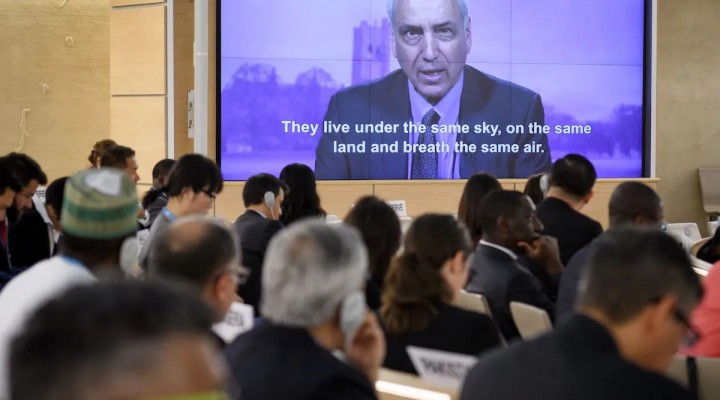The latest UN report highlights international leniency towards Israeli apartheid

UN Special Rapporteur Michael Lynk has issued one of his strongest condemnations yet of Israeli apartheid in a report to the 49th regular session of the UN Human Rights Council for Agenda Item 7; the session which, claims Israel, singles it out unfairly. Referring to various statements, including those of former Israeli ministers and officials in state institutions who called out the colonial state’s apartheid, Lynk declared, “If these responsible figures have determined that this reality is apartheid, then it is incumbent on the rest of us to test, through the tools of international law and human rights, whether these observations accurately reflect what is happening in the Palestinian territory.”
Lynk’s report notes that the Rome Statute’s legal definition of apartheid provides “a forward looking definition with a universal application”, with no reference to South Africa, the country which remains the state primarily associated with the racist system of government and the main reference when speaking about the apartheid that Palestinians face daily. In his report, Lynk reiterated, “While the historical practice of apartheid in southern Africa provides useful reference points for assessing the possible existence of apartheid elsewhere, such historical and political comparisons are never exact, and cannot be expected to be.” Israel does, moreover, satisfy the legal criteria upon which apartheid can be assessed, and Lynk has moved several steps ahead of the UN by tracing Israeli apartheid to 1967 and its subsequent military occupation of the West Bank and Gaza Strip.
Given the prohibition of apartheid as a crime against humanity in international law, the international community’s failure to stop Israel illustrates how invested it is in the colonial enterprise. Just as apartheid is deliberately implemented, Israeli colonisation and military occupation are systematic and far from temporary. “The inexorable Israeli occupation has become indistinguishable from annexation,” said Lynk, portraying the process through which Israel has moved seamlessly from one violation to another, while the UN does not even attempt to formulate an accurate reference and description of Israel’s crimes against humanity based upon the parameters of international law.
When the International Criminal Court (ICC) stated unambiguously that settlement expansion is a war crime, the UN should have reflected upon its role in legitimising Israel’s earlier settlements and drawing distinctions between 1948 and post-1967. However, the organisation’s silence only proved to Israel that the international community can still be swayed in its favour, and that the ICC would, at least for a while, be isolated in calling out Israeli apartheid.
As several human rights organisations, including a couple within Israel, have now identified Israel as an apartheid state, the UN is under greater pressure to act accordingly. “Israel has imposed upon Palestine an apartheid reality in a post-apartheid world,” Lynk pointed out. To be in a position where the UN Special Rapporteur has to recommend that the international community should adopt research and conclusions by human rights organisations about Israeli apartheid exposes the apparently inherent corruption within the UN.
With international law at its disposal, and having the means through which it can hold Israel accountable, the UN prefers to shift the responsibility upon human rights organisations to prove violations, while it does nothing substantive for the Palestinian people and their political and human rights. Michael Lynk’s report has highlighted a shocking level of international leniency as far as Israeli apartheid is concerned.
https://www.middleeastmonitor.com/20220331-the-latest-un-report-highlights-international-leniency-towards-israeli-apartheid/
 TheAltWorld
TheAltWorld 
0 thoughts on “The latest UN report highlights international leniency towards Israeli apartheid”